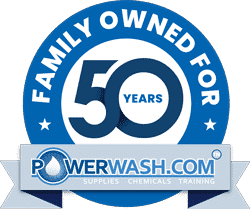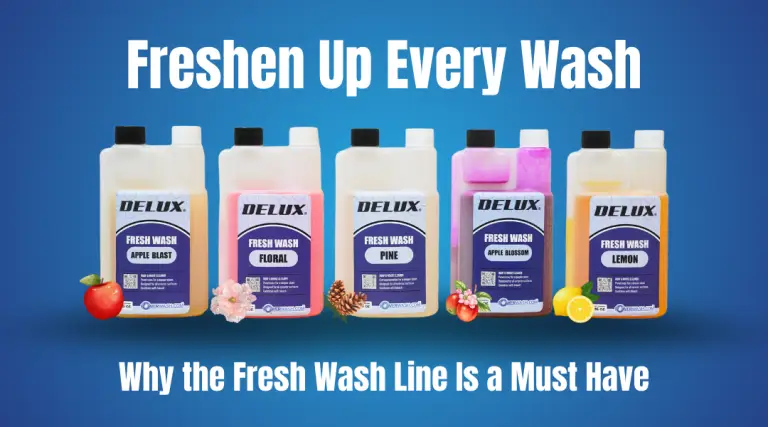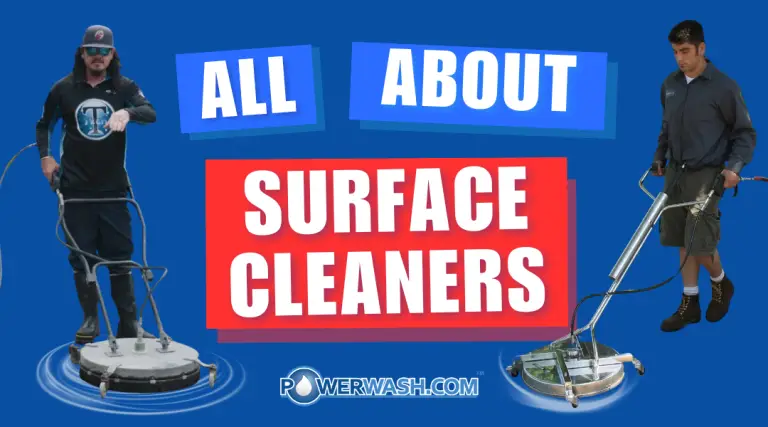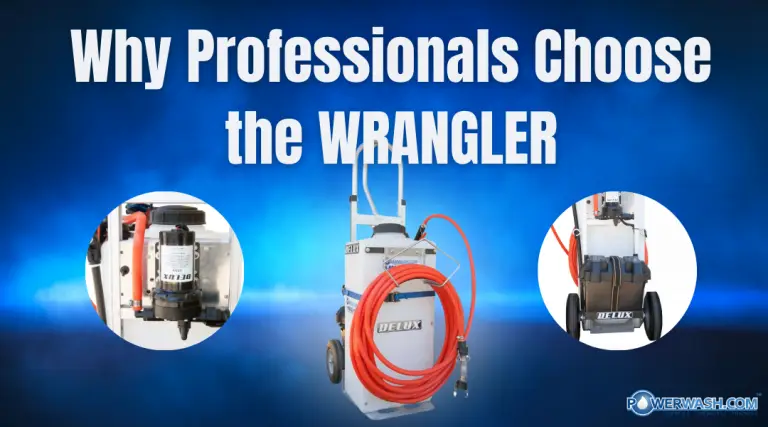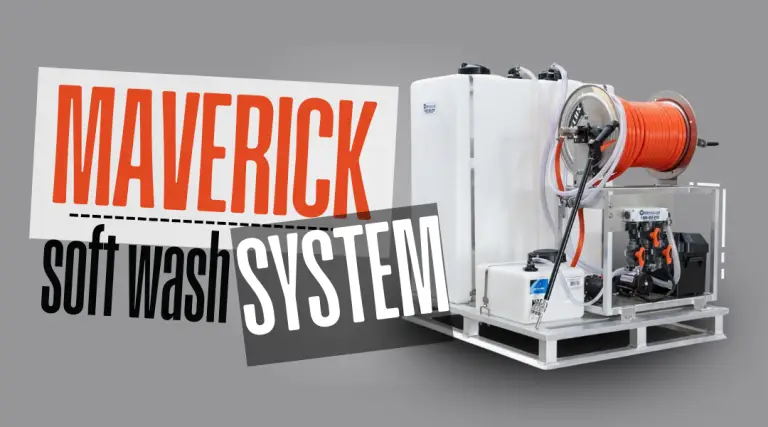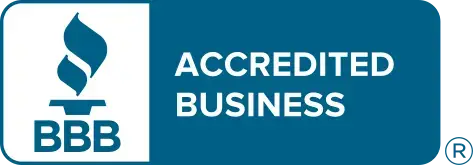- Home
- /
- Power Wash Spray Tips
- /
- Pressure Washer Surface Cleaner Facts to Know
Subscribe To Our Newsletter
Stay in the know on the latest products, deals, events, tips & tricks.
Social Media
Pressure Washer Surface Cleaner Facts to Know
A pressure washer surface cleaner is a must have accessory for anyone who cleans concrete. They can speed up your work and smooth out the final product. There are many choices when it comes to pressure washer surface cleaners and we get a lot of questions about them. Will a large pressure washer surface cleaner help you clean faster? What size nozzles should you use? What causes vibration and friction and how can you eliminate those issues? Are wheels better than floaters?
What size pressure washer surface cleaner is right for me?
When it comes to pressure washer surface cleaners, bigger is not always better. The classic rookie mistake is to buy a 36-inch pressure washer surface cleaner for a 3 GPM machine. Think about a lawn mower with a 36-inch-wide deck. Now imagine a tiny motor trying to spin that giant blade. You might be able to cut a 36-inch swath, but you wouldn’t be moving very quickly because your machine would be underpowered. Pressure washer surface cleaners are similar. Your pressure washer engine powers your system. A larger engine can turn a larger pump that will move more water and create more pressure. Water and pressure combine to spin the bar under the pressure washer surface cleaner and rinse away the grime on the surface. Your pressure washer surface cleaner should produce an even clean streak as you pass it across the surface. A spiral pattern may occur if you are moving too quickly. A smaller pressure washer surface cleaner may not cover a wide swath, but you will able to move faster to cover more area in less time. Smaller pressure washer surface cleaners are also more maneuverable, and lighter.
The swivel is Achilles heel of your pressure washer surface cleaner. The force that spins the spray bar is created by the nozzles on the tips. The swivel must be able to move rapidly without generating excessive friction. Professional swivels contain bearings that must be well lubricated to function properly. High end swivels are generally constructed from stainless steel with tungsten carbide seals. All swivels have a rating for the maximum revolutions per minute, maximum pressure, maximum flow, and maximum temperature. Check the swivel to ensure that it is rated for your machine specifications.
Concrete cleaners such as Clearly Clean X-Treme should not be run through a pressure washer surface cleaner. These alkaline cleaners will cause excessive wear on the internal components of your system.
What causes vibration in my pressure washer surface cleaner?
Nozzles for pressure washer surface cleaners are usually 1/8 inch threaded v-jet. A pressure washer surface cleaner will usually have a set of two or four nozzles. Remember to consider this when you set your desired pressure. Say you want to generate 4000 psi and you have a pressure washer surface cleaner that has two nozzles. You would divide your nozzle size in half to split 4000 psi over two nozzles. Remember that pressure must be equal on both sides. Watch out for worn out nozzles as they may cause excessive vibration.
A common rookie mistake for an under powered pressure washer surface cleaner is to try and use extremely small nozzles. This results in clogs that will slow you down. High pressure inline filters are a smart investment to prevent clogs that can occur from debris in your line, but they will not save you if your nozzle is too small.
A high-pressure ball valve fitted with a quick coupler is a great way to speed up your work. Use the ball valve to shut off the flow of water before the trigger gun, snap the line out of the quick coupler, and attach a wand to clean hard to reach areas or gum.
Should I buy a pressure washer surface cleaner with wheels or without?
Wheels or casters can be helpful to prevent fatigue, but sometimes they get in the way. A small floater can sometimes be faster than a pressure washer surface cleaner with wheels or casters, because uneven surfaces can catch your wheels and trip you up. Floaters get their name because they use water pressure to float above the surface.
The protective covering over the spinning spray bar known as the housing can be made from ABS plastic, aluminum or steel. Lots of people like to choose steel because they think it will be more durable, but steel is much heavier. Floating pressure washer surface cleaners such as the Whisper Wash Classic are made from ABS to make them easier to use. Plastic may sound cheap, but you may be surprised to know that ABS plastic is the same material used to make Lego blocks. Anyone who has stepped on a Lego in the middle of the night can attest to their strength and durability.
Recovery ports are available on some pressure washer surface cleaners to help control wash water run-off. They are designed to accept the hose from your vacuum recovery system so that you can suck up the water as you go. You must keep the brush on the rim of the pressure washer surface cleaner in good condition and carefully adjust the height of the deck to ensure a good vacuum seal. A vacuum pressure washer surface cleaner needs wheels or casters to work effectively. As I mentioned, this can sometimes make the harder to operate on rough terrain. The vacuum hose can also limit your range, because they lose suction as they get longer. The weight of the vacuum hose can also cause fatigue as it is dragged behind you. Pressure washer surface cleaners with vacuum recovery ports can help you stay in compliance with your local environmental regulations, but you should consider all of the things mentioned above before investing.
If you clean driveways, parking lots, dumpster pads, drive-thrus, patios, or sidewalks a pressure washer surface cleaner is a must have item. Once you have one, you will wonder how you ever lived without it. Do your homework. Learn what features you need. Look for quality and plan to keep some spare parts on hand to make quick repairs. If you have more questions about pressure washer surface cleaners, give our experts a call at 1-800-433-2113.
Share This Post
More To Explore
Soft Wash Additive That Smells Amazing? Meet Fresh Wash
Freshen Up Every Wash Soft washing is all about precision, power, and presentation — and nothing completes a job like ...
Mastering the Art of Pressure Washing: Key Insights on Surface Cleaners
For professionals in the pressure washing industry, a surface cleaner is an indispensable tool, particularly for those who specialize in ...
The Wrangler™ Chemical Sprayer: The Ultimate Tool for Professional Cleaning Applications
For commercial cleaners and pressure washing professionals, efficient chemical application is key to achieving the best results. The Wrangler™ Chemical ...
Professional-Grade Soft Washing with the PowerWash.com Maverick 12V Soft Wash System
Soft washing is an advanced cleaning method that utilizes low-pressure water combined with biodegradable cleaning agents to effectively remove organic ...
